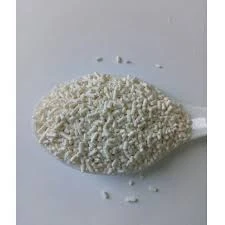
Exploring the Uses and Benefits of Trichloroisocyanuric Acid in Water Treatment
Understanding Trichloroisocyanuric Acid (TCCA) Applications and Safety
Trichloroisocyanuric acid (TCCA) is a chemical compound with the formula C3Cl3N3O3, widely recognized for its potent disinfectant and bleaching properties. As a member of the class of compounds known as chlorinated isocyanurates, TCCA has found extensive applications across various industries, particularly in water treatment, sanitation, and agricultural practices. This article delves into the characteristics, uses, and safety considerations associated with TCCA.
Chemical Properties and Structure
TCCA is a white, crystalline powder that is highly soluble in water. Its chemical structure features three chlorine atoms and three isocyanuric acid groups, making it an effective source of chlorination. Upon dissolving in water, TCCA releases chlorine, which acts as a powerful disinfectant. This property makes it essential for applications requiring microbial control.
Applications of TCCA
1. Water Treatment One of the most significant applications of TCCA is its use in water treatment facilities. The compound is widely employed for disinfecting swimming pools, drinking water supplies, and wastewater. TCCA helps eliminate harmful microorganisms, including bacteria, viruses, and algae, ensuring safe water for recreational and drinking purposes. It is favored in swimming pools due to its slow release of chlorine, which provides prolonged disinfection without the need for frequent reapplication.
2. Household and Industrial Cleaning TCCA is also utilized in household cleaning products and industrial sanitizing agents. Its efficacy in killing pathogens makes it a popular choice for disinfecting surfaces in kitchens, bathrooms, and healthcare settings. Many surface cleaners and bleaches incorporate TCCA for enhanced antimicrobial activity.
3. Agricultural Practices In agriculture, TCCA serves as a potent fungicide and algaecide. It helps in controlling disease-causing pathogens on crops, particularly in hydroponic systems and aquaculture. By ensuring that water used for irrigation is free from pathogens, TCCA contributes to healthier crops and improved yields.
tcca trichloroisocyanuric acid

4. Swimming Pools and Spas The use of TCCA in pool maintenance is one of its most common applications. Pool operators rely on TCCA to maintain water quality and prevent the growth of algae and bacteria, ensuring a safe swimming environment. Its slow-release formulation makes it ideal for maintaining consistent chlorine levels in pools.
Safety Considerations
While TCCA is an effective disinfectant and cleaning agent, it is essential to handle it with care to avoid potential hazards. Here are some critical safety considerations
- Exposure Risks TCCA can cause skin and eye irritation upon contact. Inhalation of dust or fumes may lead to respiratory issues. Individuals handling TCCA should wear appropriate personal protective equipment, including gloves, goggles, and masks, to minimize exposure risks.
- Storage and Handling TCCA should be stored in a cool, dry place, away from direct sunlight and moisture. It is also essential to keep it out of reach of unauthorized individuals, especially children, to prevent accidental ingestion or exposure.
- Environmental Impact While TCCA is a valuable tool for sanitation and disinfection, its use and disposal should be managed carefully to minimize environmental impact. Chlorinated compounds can contribute to water pollution if not correctly neutralized before disposal. Users are urged to follow local regulations regarding the disposal of chemical products.
Conclusion
Trichloroisocyanuric acid (TCCA) plays a vital role in various sectors due to its exceptional disinfectant abilities. From maintaining clean and safe swimming pools to ensuring potable water supplies and enhancing agricultural practices, TCCA's range of applications underscores its significance in public health and safety. However, awareness of safety protocols and environmental considerations is crucial for anyone working with this compound. By understanding TCCA's benefits and responsibilities, users can harness its capabilities while minimizing risks.
-
Buy High-Quality Trichloroisocyanuric Acid for Sale | TCCA 90% SupplierNewsAug.30,2025
-
Pure Sodium Dichloroisocyanurate Dihydrate | Powerful DisinfectantNewsAug.29,2025
-
Industrial Chemicals: Quality & Purity for Every IndustryNewsAug.28,2025
-
Nitrile Rubber Honoring Strict Production StandardsNewsAug.22,2025
-
Aspartame Ingredients Honoring Food Safety ValuesNewsAug.22,2025
-
Fertilizer for Balanced Plant NutritionNewsAug.22,2025
-
Cyanide Gold Processing with High Purity AdditivesNewsAug.22,2025
Hebei Tenger Chemical Technology Co., Ltd. focuses on the chemical industry and is committed to the export service of chemical raw materials.
-

view more DiethanolisopropanolamineIn the ever-growing field of chemical solutions, diethanolisopropanolamine (DEIPA) stands out as a versatile and important compound. Due to its unique chemical structure and properties, DEIPA is of interest to various industries including construction, personal care, and agriculture. -

view more TriisopropanolamineTriisopropanolamine (TIPA) alkanol amine substance, is a kind of alcohol amine compound with amino and alcohol hydroxyl, and because of its molecules contains both amino and hydroxyl. -

view more Tetramethyl Thiuram DisulfideTetramethyl thiuram disulfide, also known as TMTD, is a white to light-yellow powder with a distinct sulfur-like odor. It is soluble in organic solvents such as benzene, acetone, and ethyl acetate, making it highly versatile for use in different formulations. TMTD is known for its excellent vulcanization acceleration properties, which makes it a key ingredient in the production of rubber products. Additionally, it acts as an effective fungicide and bactericide, making it valuable in agricultural applications. Its high purity and stability ensure consistent performance, making it a preferred choice for manufacturers across various industries.





